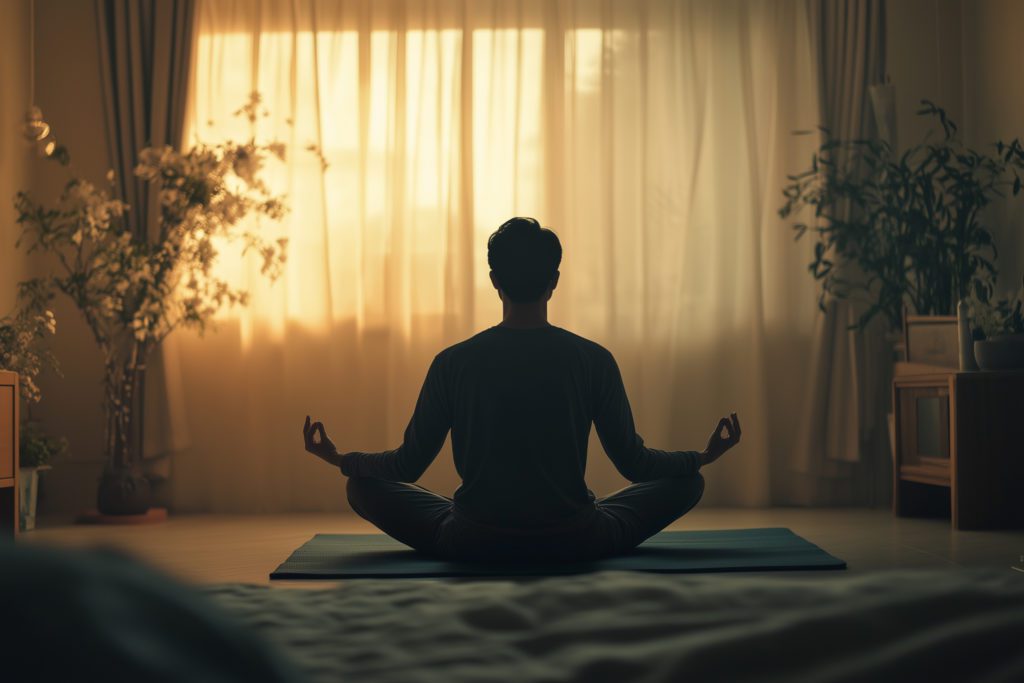
How Mindful Meditation Can Help Your Sleep
Learn about mindfulness meditation and how it can calm your mind and help you sleep at night. Explore meditation tips for beginners.

Are the thoughts in your head making it impossible to fall asleep at night? When our bodies stop moving, and we finally settle down, there’s no saying that our minds understand that it’s time to rest. For many people, this challenge is a nightly occurrence.
Many sleep disorders are tied to stress, so the more stressed you are, the harder it is for you to fall and stay asleep. However, by combating stress and promoting relaxation, such as through meditation, you can be on your way to a better night’s sleep.
In this article, we’ll answer all your questions about mindfulness and even offer some tips on how to start practicing it right now. Whether you’ve meditated before or are a beginner, you can still reap the sleep benefits if you try it.
What is Mindfulness Meditation?
Mindfulness meditation is a practice that brings your mind’s attention to the present—instead of drifting into concerns about the past or future—by focusing on your breathing. Through this mindset, you can step away from the drain of everyday thoughts and evoke a relaxation response in your body.
Meditation is considered a mind-body practice because it combines mental work with physical aspects, such as deep breathing. Mindfulness then focuses on the present moment using an open, non-judgmental mindset. This produces responses that are two-fold: mentally, you work past your stressful thoughts and feelings, while physically, it triggers a relaxation response that counteracts the stress response by reducing your heart rate, calming breathing, and slowing brain waves.
You need to practice, though. Think of meditation as a muscle you have to train; it will only be second nature to bring forth a sense of relaxation if you create muscle memory through consistent practice.
How Mindfulness Meditation Can Help You Sleep
The studies surrounding mindfulness meditation show its promising benefits for sleep. For example, a 2023 study found that older adults who completed mindfulness-based treatment for insomnia (MBTI) spent less time lying awake at night because they fell asleep quicker than those who didn’t receive MBTI.
Mindfulness meditation can also be combined with other therapies to see improved results. For example, coupling mindfulness training with cognitive behavioral therapy (CBT) reduced pain in those with chronic pain conditions and significantly improved measures of sleep quality.
Just 15 minutes of this practice a day can dramatically improve your sleep; let’s see in what ways.
Calms Your Stress Pathways
By slowing your breathing, meditation also lowers your heart rate and blood pressure, three things that rise when you’re under stress.
Research suggests that meditation can also combat stress by reducing stress hormones and preventing the activation of stress pathways in the brain.
Reduces Your Pain
Brain imaging studies have shown that similar brain areas are activated whether you’re completing mindfulness meditation or taking prescription opioids, which are commonly prescribed for pain management. However, mindfulness meditation does not rely on opioid activity, meaning that mindfulness meditation offers a method of pain management that is not addicting in the way that opioid medication is.
Improves Your Mental Outlook
When you focus your mind on the present and block any stressful thoughts of the past or future, it may become easier for you to control your reaction to these difficult experiences. Furthermore, when the past and future seem less scary, the anxious thoughts won’t haunt your mind as much, which may allow you to fall asleep more easily.
Teaches You To Disengage From Stressful Thoughts
Have you ever found yourself unable to focus on anything but a time you made a mistake in the past? It’s an all-too-easy spiral to settle into, but mindfulness meditation offers you the skills to recognize the worrisome and agitating thoughts and then disengage from them.
Instead of feeling that you have no control over your thoughts, mindfulness meditation teaches you that you can guide your thoughts by shifting your focus.
The Recipe for Mindful Meditation
Now that we know how meditation can help you sleep better, here are the things to remember when settling in to meditate so that you can have a successful session.
Concentrate
In mindfulness meditation, you’ll concentrate on your breathing, trying to focus on that and no other thoughts. Don’t get frustrated if an outside thought breaks through, though; simply acknowledge it, then direct your attention back to your breathing.
Reduce distractions
Meditation requires you to focus on your breathing, which can be hard to do if someone is chatting outside your door or a TV is audible. Before meditating, do what you can to reduce outside distractions so that it is easier to remain in the right state of mind.
Get comfortable
To reduce straying thoughts, you’ll also want to get comfortable. Whether you’d rather sit, lay down, stand, or walk, choose a position that is most comfortable for you. To aid sleeping, lying down might be the most appealing.
Once your environment is set up, follow this breathing pattern:
Place one hand on your chest and the other on your midsection; this will allow you to focus on a deep breathing technique called diaphragmatic breathing, where the hand on the chest stays still while the hand on your midsection rises.
Breathe in and out slowly through your nose, repeating 10 times. While breathing, clear your mind of other thoughts and focus only on your breaths.
Make the Most of Your Sleep Habits
Mindfulness meditation is one tool you can use to improve your sleep, with others being optimizing your sleep environment (so it is cool, dark, and quiet), following a regular sleep schedule, and exercising during the day. By practicing mindfulness meditation alongside these other habits, you’ll see the maximum benefits.
Mindfulness meditation prevents worrying thoughts from going through your mind at night. With this practice, you learn how to acknowledge the thoughts but then let them go, and practicing during the day, or even before bed, offers you the tools you need to implement at night when your anxious thoughts keep you up.
With mindfulness meditation, you can finally get a break from your racing thoughts as your mind relaxes into sleep. To start, you just need to close your eyes and breathe.
FAQ
How long does it take for mindfulness meditation to improve sleep?
While some people may notice immediate relaxation benefits, research suggests that practicing mindfulness meditation consistently for a few weeks can lead to noticeable improvements in sleep quality. Regular practice helps train the brain to disengage from stress and ease into sleep more naturally.
Can mindfulness meditation help with nightmares or night terrors?
Yes, mindfulness meditation can help reduce the frequency and intensity of nightmares by decreasing overall anxiety and promoting emotional regulation. It teaches the brain to observe distressing thoughts without overreacting, which may make nightmares less disruptive over time.
Can children or teenagers use mindfulness meditation for sleep?
Yes! Mindfulness meditation can be beneficial for children and teens, helping them develop healthy coping strategies for stress and sleep challenges. Short, guided sessions with visualization techniques are especially effective for younger individuals.
Is there a best time of day to practice mindfulness meditation?
Many people find that practicing meditation before bedtime helps them unwind, but others benefit from meditating earlier in the day to reduce overall stress. Experimenting with different times can help determine what works best for your sleep patterns.
Can mindfulness meditation improve sleep apnea or snoring?
While mindfulness meditation does not directly treat sleep apnea, it may help by reducing stress-related breathing irregularities and improving overall sleep quality. If sleep apnea is suspected, seeking medical advice for treatment options is essential.

Written by
Jessica G
Medical writer freelancer who has written hundreds of articles on varying topics. Masters of Engineering degree in Biomedical Engineering.
Download Pillow
Get help
Press & News
Legal
Connect
X (Twitter)
Company
Copyright © Neybox Digital Ltd.



